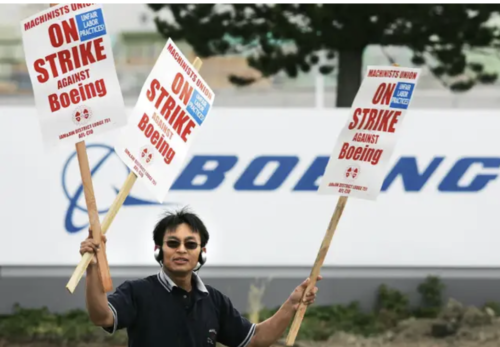On September 13, 2024, after a less-than-promising pay raise proposal of 30% over 33,000 workers in the IAM (International Association of Machinists and Aerospace Workers) union went on strike against air and space corporate giant Boeing.
In the past, employment at the commercial plane producer, located historically in the Seattle, Washington area, was a straight path to an upper-middle-class life. Today, Boeing employees feel left behind. They see their executives claim the big bucks, and inflation and the cost of living skyrocket all while their paychecks remain the same.
The walkout began on September 13th, after Boeing rejected a proposed contract from the workers in which they requested a 25% raise over the next 4 years. Following the rejection of the proposed contract, members of the IAM voted 96% in favor of a strike. Workers are now protesting for a 40% increase in pay and the re-institution of benefits the company eliminated a decade ago. As a result of the 33,000-worker walkout, non-unionized workers have been temporarily suspended due to the shortage of work.
This past week, Federal mediators have become involved in helping both parties achieve a solution. However, officials from both Boeing and IAM have reported that little progress has been made during the two negotiating sessions that have occurred thus far. Boeing CEO Kelly Ortherberg made the following statement addressing the issue, “While we are disappointed the discussions didn’t lead to more progress, we remain committed to reaching an agreement as soon as possible that recognizes the hard work of our employees and ends the work stoppage in the Pacific Northwest.”
Ariel McKenzie, one of the 33,000 Boeing employees currently on strike, shared her family’s story in the Washington Post. She recalled the comfortable and luxurious life she and her family lived when her father first landed a job at Boeing 20 years ago.
Seeing her dad’s benefits, McKenzie wanted to follow in her father’s footsteps to give her family the life she had had growing up. However, this didn’t turn out to be the case. As prices rose due to growing inflation, Boeing fell behind, leaving its workers struggling with unchanged salaries. After about a decade, McKenzie said working at Boeing did not give her the same financial boost as it had given her dad. Now, McKenzie has to work a second job or overtime for the company to match a similar pay to the kind her father received. McKenzie expressed how frustrating and sad it is that this job, which was sought after for many years, can no longer provide for families and communities.
The recent strike by over 33,000 IAM union workers at Boeing shows the struggles of the fight for fair pay in a time of rising living costs. Workers are standing up for a significant pay increase and the return of benefits they once had. This reflects the growing frustration with companies that prioritize high profits and executive salaries over the needs of employees. Ariel McKenzie’s story highlights how many families, once secure in their jobs at Boeing, now struggle to make ends meet. Meanwhile, the higher-ups become richer and richer. As negotiations continue, the federal mediators stepping in emphasize the importance of finding a solution that allows the workers to have fair pay while still allowing Boeing to be profitable. The outcome of this strike will affect not only Boeing employees but also set an example for labor rights in other industries, showing the need for fair treatment in today’s economy.






